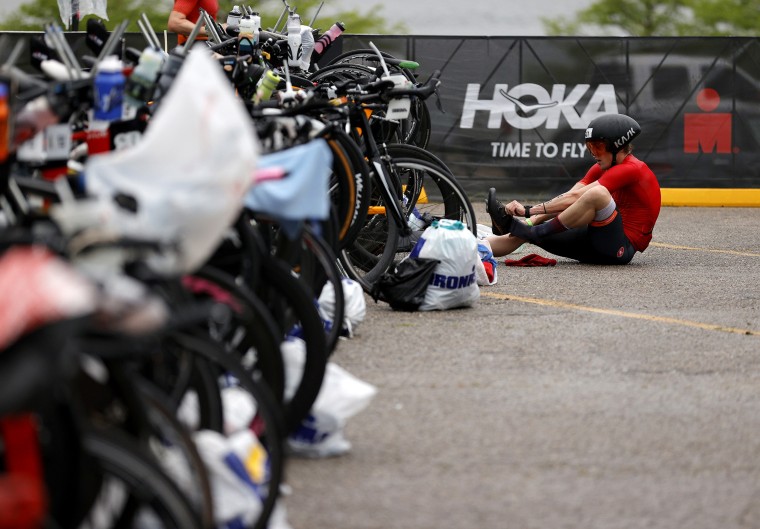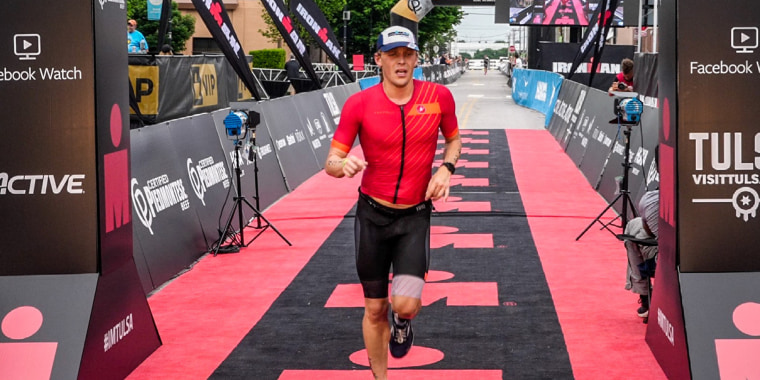Noel Mulkey hopes to show people there is a way out of drug addiction — and life on the other side is well worth the effort.
Only six years after becoming sober, Mulkey recently finished the Tulsa Ironman triathlon — a full marathon, a 2.4-mile swim in open water and 112-mile bike ride — in 9 hours and 25 minutes securing a spot in Kona, the Ironman World Championship in Hawaii.
“Exercise saved my life,” Mulkey, 26, of Tulsa, Oklahoma, told TODAY. “Running, exercise, cardio there is no greater medication on Earth.”
Mulkey gained a following on social media by sharing his story and his intense training regimen. But he hopes people see that those recovering from addiction or living with a mental health condition can thrive.
“There is a lot of stigma with mental health,” he said. “You are never stuck. I feel like there is a way out, no matter how hopeless you feel because I truly could never never envision (finishing an Ironman), ever. I could barely walk around the block.”
From addiction to athlete
In eighth grade, Mulkey started using pot and drinking. His drug use escalated. By the time he was 16, he was using intravenous drugs, which eventually became a $500-a-day heroin addiction by college. He couldn’t go more than three hours without using and he pawned all his mom’s jewelry to pay for his habit.
“I would get so sick and it got super bad that my parents basically couldn’t work because they thought I was going to die,” he explained. “I just never felt ready to quit.”
He tried to quit several times and at his family’s urging, he went to a Florida rehab center. But he didn’t stop using then. At one point, he looked at his life and realized he didn’t like living this way: He didn’t want to be shooting up every few hours in order to not feel sick and he constantly worried about his family.
“When I finally chose to get sober, I chose to get my life together. That is when I finally detoxed,” Mulkey said. “It was the most pain I’ve ever been in, detoxing.”
After working so hard to become sober, he felt committed to it. But still, he struggled. He felt overwhelmed and turned to food for comfort. At his heaviest, he weighed 198 pounds.
“I just had nothing. I was not in college anymore. I was finally off drugs but I had no aspirations, no nothing,” Mulkey said. “I was just very depressed. I ate a lot and hated the way I looked.”
When he could no longer squeeze into his favorite pair of pants, he decided to take a run. But it wasn’t easy.
“I just kind of hit me and one day I went out for a run, just around the block … I could barely make the block and it was very painful but I loved it,” Mulkey said. “I grew up as athletic. My parents were athletes. I played soccer when I was in middle school and I just never pictured myself as getting overweight.”

Mulkey went from never exercising to running 60 to 70 miles a week.
“I kind of switched addictions. I 100% fell in love with running,” he said. “In the next four months I went from 198 pounds to 139.”
His dad worried that if Mulkey were injured he might relapse and start using drugs again. So he recommended his son meet with sports medicine experts and try other exercise methods, such as biking and swimming. He realized he loved it all.
I 100% fell in love with running,"
Noel Mulkey
“There was a sprint race,” he said. “I signed up for it and I came in third overall fresh out of the water.”
Several months later, he completed an Olympic distance triathlon and he was hooked.
“I just kind of took off,” he said. “I just became super addicted to training and I spent three years just going crazy, training myself, and then finally hired a coach.”
Exercise helps Mulkey cope with stress.
“It is 100% my outlet,” he said. “You learn a lot. You’re just in your head the whole time for six hours (during training).”
About a year after becoming sober, Mulkey learned that he has bipolar II disorder. Suddenly, a lot of things fell into place for him.
“It was really hard to get a proper diagnosis for me because I was always self-medicating. I was always on drugs,” he said. “It just felt good to finally understand. Then I read about it. Everything I’ve always had like hypomania, starting projects that I never finish, extreme anxiety and then extreme depression, just everything clicked.”
Changing the story
In rehab, Mulkey recalled hearing horror stories of how people struggled with addiction and then some tragedy hit. Maybe they were arrested or maybe they even died. Mulkey’s life shows the success of recovery.
“I feel like that would really help to see an example of there is a way out of (addiction),” he said. “It was all negative stories.”
But he also hopes his story inspires others to seek help if they need it — for mental health or addiction.
“I want people to reach out,” he said. “There are always people who will listen.”
While he is thrilled to be competing in Kona in October, he also appreciates what he has learned about himself.
“I found I am a lot tougher than I ever gave myself credit for and resilient,” he said. “It makes you a very confident person, or at least it did for me.”

